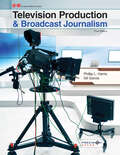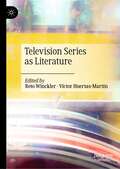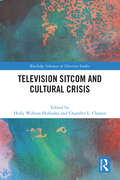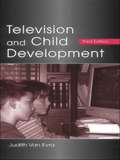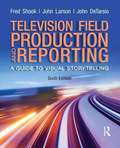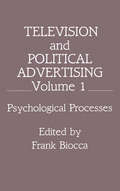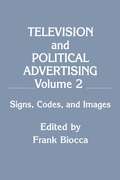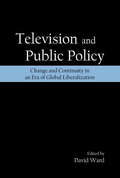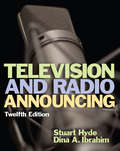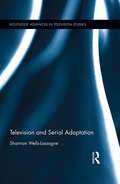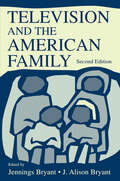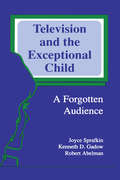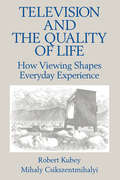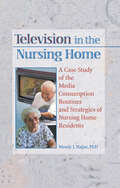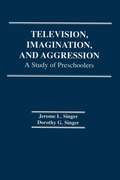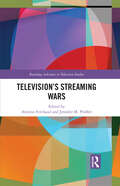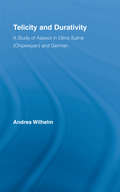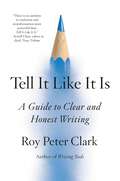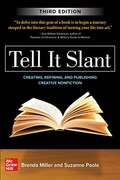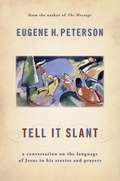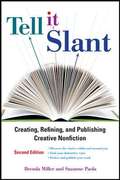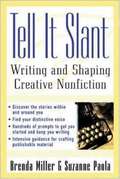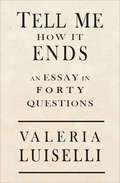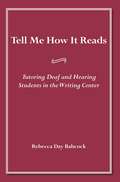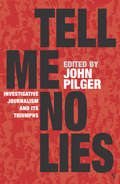- Table View
- List View
Television Production and Broadcast Journalism
by Phillip L. Harris Gil GarciaTelevision Production & Broadcast Journalism provides students with basic technical skills necessary to enter the television production industry as a production assistant, and introduces broadcast journalism theory. The text provides an overview of the equipment, job responsibilities, and techniques involved in both traditional studio production and remote location work. The activities and processes involved in each phase of production are presented and reinforced with realistic examples, numerous photos showing students in actual production situations, and engaging student activities. <p><p>Broadcast journalism coverage includes ethics and news judgment, types of stories, news writing, preparing news packages, and conducting interviews. The broadcast journalism topics address skills and qualities required in the industry, but also incorporate classroom-appropriate standards and practices.
Television Series as Literature
by Reto Winckler Víctor Huertas-MartínThis book explores how television series can be understood as a form of literature, bridging the gap between literary and television studies. It goes beyond existing adaptation studies and narratological approaches to television series in both its scope and depth. The respective chapters address literary works, themes, tropes, techniques, values, genres, and movements in relation to a broad variety of television series, while drawing on the theoretical work of a host of scholars from Simone de Beauvoir and Yuri Lotman to Ted Nannicelli and Jason Mittel, and on critical approaches ranging from narratology and semiotics to empirical sociology and phenomenology. The book fosters new ways of understanding television series and literature and lays the groundwork for future scholarship in a number of fields. By questioning the alleged divide between television series and works of literature, it contributes not only to a better understanding of television series and literary texts themselves, but also to the development of interdisciplinary scholarship in the humanities.
Television Sitcom and Cultural Crisis (Routledge Advances in Television Studies)
by Holly Willson Holladay Chandler L. ClassenThis volume demonstrates that television comedies are conduits through which we might resist normative ways of thinking about cultural crises.By drawing on Gramscian notion of crisis and the understanding that crises are overlapping, interconnected, and mutually constitutive, the essays in this collection demonstrate that situation comedies do more than make us laugh; they also help us understand the complexities of our social world’s moments of crisis. Each chapter takes up the televisual representation of a modern cultural crisis in a contemporary sitcom and is grounded in the extensive body of literature that suggests that levity is a powerful mechanism to make sense of and cope with these difficult cultural experiences.Divided into thematic sections that highlight crises of institutions and systems, identity and representation, and speculation and futurism, this book will interest scholars of media and cultural studies, political economy, communication studies, and humor studies.
Television and Child Development
by Judith Van EvraTelevision continues to play a major role in the lives of most children and adolescents, but current research also reflects the explosive growth in new technologies and their widespread use by young people. Integrating information from communication literature as well as from child development and other psychological domains, author Judith Van Evra presents a summary and synthesis of what is currently known about the media's impact on children's physical, cognitive, social, and emotional development, to help discern the complex and significant interplay between other forces in a child's life and the use of various media. This third edition contains updated and expanded coverage of research findings and a review of changing trends in media use including computers, the Internet, books and magazines, music videos, and video games as well as television. New chapters focus on basic research designs and methodologies; cultural diversity; health-related matters and lifestyle choices; media's impact on various social-emotional aspects of a child's development; the use of technology for information and for entertainment; and intervention possibilities, parent strategies, and education. An overall conclusions section at the end of the book provides a cogent summary of findings to date and stimulates discussion of questions and ideas for future research. Television and Child Development explores how, and to what extent, television and other media actually affect children, and what role other variables may play in mediating their impact, so that we can maximize technology's potential for enriching children's cognitive, social, and emotional development, while at the same time minimizing any negative influence. This text is appropriate for researchers, teachers, and students in communications, developmental and social psychology, and education, as well as in areas of advertising, leisure studies, family studies, and health promotion.
Television and Field Reporting (Subscription)
by Fred Shook John Larson John DetarsioTelevision Field Production and Reporting provides an exciting introduction to the art of visual storytelling. Endorsed by the National Press Photographers Association, it focuses on the many techniques and tools available in television today. The new edition of Television Field Production and Reporting will be 4-color for the first time, an absolute must in this visually oriented, rapidly changing field..
Television and Political Advertising: Volume I: Psychological Processes (Routledge Communication Series)
by Frank BioccaThis volume represents one of the first major scholarly effort to unravel the psychological and symbolic processing of political advertising. Utilizing survey, experimental, qualitative, and semiotic methodologies to study this phenomenon, the contributors to Television and Political Advertising trace how political ads help to interpret the psychological reality of the presidential campaign in the minds of millions of voters. A product of the National Political Advertising Research Project, this interdisciplinary effort is valuable to researchers in advertising, communication, and consumer psychology since it helps define future work on the relationship between television, politics, and the mind of the voter. This volume, Television and Political Advertising: Psychological Processes, is the first of two, and covers such topics as Models and Theories for Viewing Political Television; Psychological Processing of Issues, Images, and Form; Differential Processing of Positive and Negative Advertising; and The Psychological Contexts of Processing.
Television and Political Advertising: Volume Ii: Signs, Codes, and Images (Routledge Communication Series)
by Frank BioccaThis volume represents one of the first major scholarly efforts to unravel the psychological and symbolic processing of political advertising. Utilizing survey, experimental, qualitative, and semiotic methodologies to study this phenomenon, the contributors to Television and Political Advertising trace how political ads help to interpret the psychological reality of the presidential campaign in the minds of millions of voters. A product of the National Political Advertising Research Project, this interdisciplinary effort is valuable to researchers in advertising, communication, and consumer psychology since it helps define future work on the relationship between television, politics, and the mind of the voter. This volume, Television and Political Advertising: Signs, Codes and Images, is the second of two, and covers such areas as Generating Meaning in the Pursuit of Power, Analyses of the Meaning of Political Ads, The Campaign Documentary as an Ad, and Regulating Signs and Images.
Television and Public Policy: Change and Continuity in an Era of Global Liberalization
by David WardThe significant changes that have swept the television industry over the last two decades, most notably a shift to deregulation in broadcast media, prompt a discussion on how to ensure that meaningful content is available to the viewer. Television and Public Policy analyzes the current state of television systems in a selected group of countries by exploring the political, economic, and technological factors that have shaped the sector in such a short span of time. Consequently, by positioning the television sector within issues of media policy and the regulatory framework, the book questions what these trends mean for television, and the historical, political, and cultural role in our societies. Television and Public Policy distinguishes itself in several ways:*It is a global project in its comparative scope and subject area. Contributors represent countries including Australia, Brazil, Canada, China, Egypt, India, Iran, Ireland, Israel, Italy, Japan, the Netherlands, New Zealand, Poland, the United Kingdom, and the United States.*It is contemporary and filled with information largely absent in current literature.*It offers original analysis of the contemporary television sector. This book speaks to a broad range of academics, postgraduate, and undergraduate students, and can serve as a key resource for courses ranging from media studies, to development studies, international relations, and law.
Television and Radio Announcing: Text With Audio Cd
by Stuart HydeThe digital revolution has significantly changed broadcast technology. The 12th edition of Television and Radio Announcing reflects new trends in the field, such as the reconfiguration of electronic media production practices and distribution models. The internet and social media have opened up new access to production and new methods of distribution, such as YouTube, Facebook, Twitter, and podcasts. The 12th edition addresses the realities of students who live in this new era. Learning GoalsUpon completing this book, readers will be able to: Develop essential announcing skills Understand new trends in the field
Television and Serial Adaptation (Routledge Advances in Television Studies)
by Shannon Wells-LassagneAs American television continues to garner considerable esteem, rivalling the seventh art in its "cinematic" aesthetics and the complexity of its narratives, one aspect of its development has been relatively unexamined. While film has long acknowledged its tendency to adapt, an ability that contributed to its status as narrative art (capable of translating canonical texts onto the screen), television adaptations have seemingly been relegated to the miniseries or classic serial. From remakes and reboots to transmedia storytelling, loose adaptations or adaptations which last but a single episode, the recycling of pre-existing narrative is a practice that is just as common in television as in film, and this text seeks to rectify that oversight, examining series from M*A*S*H to Game of Thrones, Pride and Prejudice to Castle.
Television and the American Family
by J. Alison BryantThis second edition of a trend-setting volume provides an updated examination of the interaction between families and the most pervasive mass medium: television. Charting the dynamic developments of the American family and television over the past decade, this volume provides a comprehensive representation of programmatic research into family and television and examines extensively the uses families make of television, how extensions of television affect usage, families' evolving attitudes toward television, the ways families have been and are portrayed on television, the effects television has on families, and the ways in which families can mediate its impact on their lives. The volume is an invaluable resource for scholars and students in the areas of media and society, children and media, and family studies.
Television and the Exceptional Child: A Forgotten Audience (Routledge Communication Series)
by Joyce Sprafkin Kenneth D. Gadow Robert AbelmanThe question of what types of children are most influenced by -- or can best benefit from -- television is a recurrent theme in the scientific literature as well as a frequently raised issue for pediatric associations, educators, and parent/citizen groups concerned about the welfare and advancement of young children. To effectively address this question, this book focuses on a wide variety of children with highly divergent cognitive abilities, social skills, and educational capacities -- that is, those labeled as emotionally disturbed, learning disabled, mentally retarded, and intellectually gifted. These children not only possess characteristics that place them at the greatest risk with regard to television's negative impact, but also in a position to most benefit from the purposeful use of the medium at home and in the classroom. Combining literature from the fields of mass communication, developmental psychology, and special education, the authors present a comprehensive analysis of television and its "forgotten audience." Practical implications and applications in the home and school are also extracted from research findings making this volume a valuable resource for students, educators, and researchers in the fields of communication and special education, and for the parents and teachers of exceptional children.
Television and the Quality of Life: How Viewing Shapes Everyday Experience (Routledge Communication Series)
by Robert Kubey Mihalyi CsikszentmihalyiEmploying a unique research methodology that enables people to report on their normal activities as they occur, the authors examine how people actually use and experience television -- and how television viewing both contributes to and detracts from the quality of everyday life. Studied within the natural context of everyday living, and drawing comparisons between television viewing and a variety of other daily activities and leisure pursuits, this unusual book explores whether television is a boon or a detriment to family life; how people feel and think before, during, and after television viewing; what causes television habits to develop; and what causes heavy viewing -- and what heavy viewing causes -- in the short and long term. Television and the Quality of Life also compares the viewing experience cross-nationally using samples from the United States, Italy, Canada, and Germany -- and then interprets the findings within a broad theoretical and historical framework that considers how information use and daily activity contribute to individual, familial, societal, and cultural development.
Television in the Nursing Home: A Case Study of the Media Consumption Routines and Strategies of Nursing Home Residents
by Wendy J HajjarTelevision in the Nursing Home: A Case Study of the Media Consumption Routines and Strategies of Nursing Home Residents is a three-stage ethnographic study of media use by the elderly in long-term care facilities. This research concludes that watching television is the most prevalent and pervasive activity for patients. Activity directors can now learn how television and media can offer diversion, enhancement of personality, awareness, and sociability to their patients and offers suggestions on roommate coordination, selection of appropriate media, and communication resources. Containing the latest knowledge involving communication and gerontology, Television in the Nursing Home will help you offer programs that will meet the demands of an expanding elderly population.Developed as a perspective for examining patterns of social interaction, Television in the Nursing Home gives suggestions on how you can use the media to create new activities for patients, maximizing the television as a resource for the elderly. You will gain valuable insight on: proof to dispel the myth that television in long-term patient care causes withdrawal and depression a breakthrough in the treatment of media and aging, enhancing media-based activities and the use and purchase of electronic equipment for care facilities studies on how and why television is the most accessible medium of communication information for the development of new media designed specifically for use by the elderly creation of media-centered activities that recognize the potential for therapeutic use of communication technologies in the nursing homeThe research presented in Television in the Nursing Home establishes the fact that television consumption, once thought to be problematic, should be seen as desirable and necessary. This important book also proves how television is a resource that provides comfort, self-expression, and sociality. This first-ever study will convince you that television and media use in long-term care is beneficial and essential to the wellness of your patients.
Television, Imagination, and Aggression: A Study of Preschoolers
by D. G. SingerFirst Published in 1981. Routledge is an imprint of Taylor & Francis, an informa company.
Television’s Streaming Wars (Routledge Advances in Television Studies)
by Arienne Ferchaud Jennifer M. ProffittThis volume addresses contemporary debates and trends regarding the production and distribution, content, and audience engagement with the television streaming industry. The book interrogates the economics and structure of the industry, questions the types and diversity of content perpetuated on streaming services, and addresses how audiences engage with content from US and global perspectives and within various research paradigms. Chapters address television streaming wars, including the debates and trends in terms of its production and competition, diversity and growth of programming, and audience consumption, focusing on multiple platforms, content, and users. This timely and creative volume will interest students and scholars working in television studies, media industry studies, popular culture studies, audience studies, media psychology, critical cultural studies and media economics.
Telicity and Durativity: A Study of Aspect in Dëne Suliné (Chipewyan) and German (Outstanding Dissertations in Linguistics)
by Andrea Luise WilhelmThis book studies the linguistic representation of events by examining the relevance of two salient event characteristics-- telicity and durativity-- to the grammatical system of natural language. The study of events, and of event characteristics, is an important testing ground for theories on the boundary between extralinguistic and linguistic knowledge, and on the relation between semantics and syntax. Telicity and durativity are notions which have become increasingly influential in both the semantic and the syntactic, i.e., grammaticalized, representation of events. The book furthers the understanding of events through the comparison of two genetically and typologically distinct languages, German and Dëne Suliné (Chipewyan/Athapaskan), an indigenous language of Northwestern Canada. It contains the first in-depth documentation of the aspectual system of Dëne Suliné, and a careful analysis of the aspectual behaviour of German particle verbs. A stringent methodology considers semantic, pragmatic, and grammatical factors in both languages. The data reveal that telicity and durativity belong to profoundly different semantic and grammatical domains, and that neither notion is grammaticalized universally. While both notions are represented semantically in German as well as in Dëne Suliné, telicity is grammaticalized only in the former and durativity is grammaticalized only in the latter.
Tell It Like It Is: A Guide to Clear and Honest Writing
by Roy Peter ClarkAmerica's favorite writing coach and bestselling author returns with an "indispensable" guide (Diana K. Sugg, Pulitzer Prize-winning reporter) to writing clearly and honestly in a world full of lies, propaganda, and misinformation. The darker and more dystopian the future appears, the more influential public writers become. But with so much content vying for our attention, and so much misinformation and propaganda polluting public discourse, how can writers break through the noise to inform an increasingly busy, stressed, and overwhelmed audience? In Tell It Like It Is, bestselling author, writing coach, and teacher Roy Peter Clark offers a succinct and practical guide to writing with clarity, honesty, and conviction. By analyzing stellar writing samples from a diverse collection of public writers, Clark highlights and explains the tools journalists, scientists, economists, fact-checkers, even storytellers use to engage, inform, and hook readers, and how best to deploy them in a variety of contexts. In doing so, he provides answers to some of the most pressing questions facing writers today: How do I make hard facts—about pandemics, wars, natural disasters, social justice—easy reading? How do I get readers to pay attention to what they need to know? How do I help contribute to a culture of writing that combats misinformation and propaganda? How do I instill hope into the hearts and minds of readers? With Clark's trademark wit, insight, and compassion, Tell It Like It Is offers a uniquely practical and engaging guide to public writing in unprecedented times—and an urgently needed remedy for a dangerously confused world.
Tell It Slant, Third Edition
by Suzanne Paola Brenda MillerTwo award-winning authors reveal everything you need to know to develop your own distinctive voice and craft compelling, creative nonfiction “Tell all the Truth but tell it Slant.” —Emily Dickinson With these words, Dickinson offers sound advice for nonfiction writers: Tell the truth but become more than mere transcribers of daily life. Since 2003, Tell It Slant has set the standard for creative nonfiction instruction, showing writers how to move beyond mere facts and, instead, make the most of their own “slant” on the world. This revised and updated third edition offers: • New and expanded chapters on writing about identity, maintaining a productive work/life balance, and navigating the publishing industry • An anthology with diverse pieces that range from traditional essay to the graphic memoir • Expanded discussion of contemporary and emerging literary forms • New “Try It” writing exercises throughout the book Whether planning a course or learning on your own, Tell It Slant provides everything you need to know to develop a distinctive voice and to craft compelling creative nonfiction. This book provides the basis for a complete education in nonfiction writing, wherever your classroom might be. “Tell It Slant is a valuable and comprehensive resource for nonfiction writers, filled with exhilarating examples, powerful exercises, and pure inspiration. Miller and Paola are gifted teachers and writers with endless wisdom to share and a lovely way of sharing it with struggling writers at every level.” —Dinty W. Moore, author of The Mindful Writer: Noble Truths of the Writing Life
Tell It Slant: A Conversation on the Language of Jesus in His Stories and Prayers
by Eugene H. PetersonA work that will deepen one's understanding of Scripture and strengthen awareness that language is a gift of God, this volume focuses on Jesus' words in daily contexts, and examines how he addresses God in prayer.
Tell It Slant: Creating, Refining, and Publishing Creative Nonfiction (Second Edition)
by Suzanne Paola Brenda MillerFive stars for Tell It Slant . . . An enlightening, comprehensive, and very satisfying text on writing and shaping creative nonfiction. " --Sheila Bender, editor and publisher of writingitreal. com and author of Writing and Publishing Personal Essays When the poet Emily Dickinson wrote, "Tell all the Truth but tell it Slant," she provided today's writers of creative nonfiction some sound advice: tell the truth but don't become mere transcribers of day-to-day life. Whether you are writing a memoir or researched essay, the award-winning authors will guide you along the journey, using intensive instruction and an abundance of writing exercises. You will learn how to find a distinctive voice, use prompts to get started and keep writing, discover stories in impossible places, tackle (and enjoy) background research, and more. This second edition includes a new chapter on publication--print, digital; an update on "The Particular Challenges of Creative Nonfiction" chapter to include references to James Frey and other controversies regarding nonfiction ethics; and an expanded resource section and bibliography.
Tell It Slant: Writing and Shaping Creative Nonfiction
by Suzanne Paola Brenda MillerWhen the poet Emily Dickinson wrote, "Tell all the Truth but tell it Slant," she provided today's writers of creative nonfiction some sound advice: tell the truth but don't become mere transcribers of day-to-day life. Artistic truth offers a depth and vibrancy that goes beyond the everyday. But how do we, as writers, move beyond cold fact to create elegant nonfiction that makes the most of our individual "slant" on the world we live in? The award-winning authors of Tell It Slant stretch your writing muscles as they reveal the specialized art of creative nonfiction. Whether you are writing a memoir, researched essays, or investigative reporting, the authors will guide you along your journey, using intensive instruction and an abundance of writing exercises to show you how to: Gain access to your own memories; Look for material outside of yourself; Address ethical issues when writing about other people; Tackle (and enjoy) background research; Avoid cliches and discover fresh language; And keep the passion of writing alive.
Tell Me How It Ends: An Essay in 40 Questions (The Golden Greek)
by Valeria LuiselliAmerican Book Award Winner: A &“moving, intimate&” account of serving as a translator for undocumented children facing deportation (The New York Times Book Review). Nonfiction Finalist for the Kirkus PrizeFinalist for National Book Critics Circle Award for Criticism Structured around the forty questions volunteer worker Valeria Luiselli translates from a court system form and asks undocumented Latin American children facing deportation, Tell Me How It Ends humanizes these young migrants and highlights the contradiction between the idea of America as a fiction for immigrants and the reality of racism and fear—here and back home. &“Luiselli&’s prose is always lush and astute, but this long essay, which borrows its framework from questions on the cold, bureaucratic work sheets with which she became so familiar (for example, &‘Did anything happen on your trip to the U.S. that scared or hurt you?&’), is teeming with urgency…In this slim volume about the spectacular failure of the American Dream, she tells the stories of the unnamed children she&’s encountered and their fears and desires, as well as her own family&’s immigration story.&” —Vulture &“Worthy of inclusion in a great American (and international) canon of writing about migration.&” –Texas Observer &“A powerful indictment of American immigration policy, [Tell Me How It Ends] examines a system that has failed child refugees in particular.&” —Financial Times &“Masterfully blends journalism, auto/biography, and political history into a compelling and cohesive narrative. . . . Luiselli uses the personal to get political but smartly sidesteps identity politics to focus on policy instead.&”—The Rumpus
Tell Me How It Reads: Tutoring Deaf and Hearing Students in the Writing Center
by Rebecca Day BabcockDeaf students are attending mainstream postsecondary institutions in increasing numbers, raising the stakes for the complicated and multifaceted task of tutoring deaf students at these schools. Common tutoring practices used with hearing students do not necessarily work for deaf people. Rebecca Day Babcock researched and wrote Tell Me How It Reads: Tutoring Deaf and Hearing Students in the Writing Center to supply writing instructors an effective set of methods for teaching Deaf and other students how to be better writers. Babcock's book is based on the resulting study of tutoring writing in the college context with both deaf and hearing students and their tutors. She describes in detail sessions between deaf students, hearing tutors, and the interpreters that help them communicate, using a variety of English or contact signing rather than ASL in the tutorials. These experiences illustrate the key differences between deaf-hearing and hearing-hearing tutorials and suggest ways to modify tutoring and tutor-training practices accordingly. Although this study describes methods for tutoring deaf students, its focus on students who learn differently can apply to teaching writing to Learning Disabled students, ESL students, and other students with different learning styles. Ultimately, the well-grounded theory analysis within Tell Me How It Reads provides a complete paradigm for tutoring in all writing centers.
Tell Me No Lies: Investigative Journalism and its Triumphs
by John PilgerTell Me No Lies is a celebration of the very best investigative journalism, and includes writing by some of the greatest practitioners of the craft: Seymour Hersh on the My Lai massacre; Paul Foot on the Lockerbie cover-up; Wilfred Burchett, the first Westerner to enter Hiroshima following the atomic bombing; Israeli journalist Amira Hass, reporting from the Gaza Strip in the 1990s; Gunter Wallraff, the great German undercover reporter; Jessica Mitford on 'The American Way of Death'; Martha Gelhorn on the liberation of the death camp at Dachau. The book - a selection of articles, broadcasts and books extracts that revealed important and disturbing truths - ranges from across many of the critical events, scandals and struggles of the past fifty years. Along the way it bears witness to epic injustices committed against the peoples of Vietnam, Cambodia, East Timor and Palestine. John Pilger sets each piece of reporting in its context and introduces the collection with a passionate essay arguing that the kind of journalism he celebrates here is being subverted by the very forces that ought to be its enemy. Taken as a whole, the book tells an extraordinary 'secret history' of the modern era. It is also a call to arms to journalists everywhere - before it is too late.
